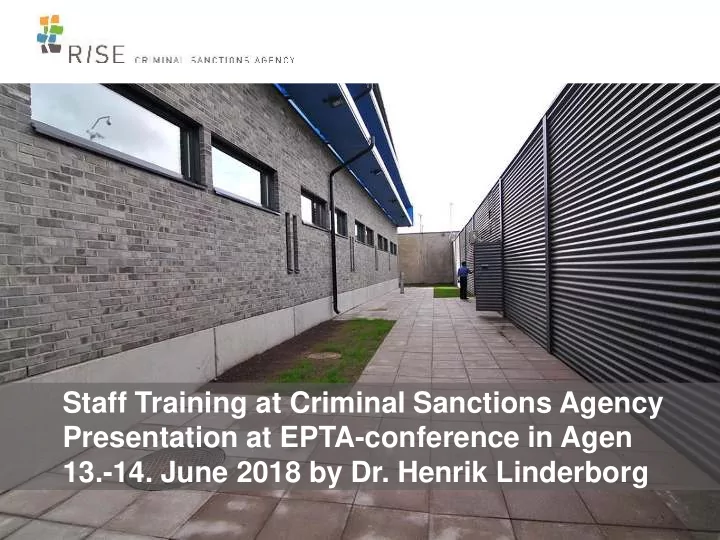

Staff Training at Criminal Sanctions Agency Presentation at EPTA-conference in Agen 13.-14. June 2018 by Dr. Henrik Linderborg
WHY IS IT IMPORTANT TO REFORM THE STAFF TRAINING Changes in criminal policy challenge accustomed work and organizational cultures in the criminal sanctions field. Need to develop penal practices in line with the new criminal policy so that: Basic rights and liberties as well as human rights are protected • Treatment is humane, appropriate and equal • All activities are lawful and comply with justice and fairness • Enforcement is carried out so that it supports the sentenced • persons’ individual growth as well as their intention to lead a life without crime Enforcement is carried in managerially effective way •
TRAINING OF PRISON AND PROBATION STAFF UNTIL NOW The Training Institute for Prison and Probation Services (RSKK) was • founded in 1976 under the Ministry of Justice to provide vocational education for the prison and probation services staff in Finland. Today the Training Institute offers basic prison and probation services • training as well as continued and further education for the prison and probation services staff in all of Finland.
Prison officer’s training Program
The Curriculum includes Prison service and basic duties of Criminal law, administrative officers law, human rights issues Security Finnish language and prison Counselling literature Care and Support English language Psychology and professional (Swedish and Russian ethics language are voluntary) Social sciences, criminology, Self defence and use of force minority cultures
Bachelor Education in Corrections Two-phase education introduced in 2018 • The students pass first the basic training program (16 months 90 • credits) at the Training Institute Two-third of the students will after that take the bachelor degree • in corrections (sosionomi) at the Laurea University of Applied Sciences
The goals of integrating two study programs were as follows: To increase the attractiveness of the study program and corrections • To increase flexibility and alternative study modules into study • program To enhance the career options and staff exchange between prison • and probation units (“to break the glass wall” between the two functions of corrections To boost the cultural change in prisons towards multi-professionalism • (Heidi Kajander. The Dilemma of implementing interactive work in the Finnish Prison Service. Master thesis. University of Cambridge 2017)
The goal is also to change the prevailing professional culture Because: Security seems to be still the preferable work approach among • Finnish prison officers, especially in closed prisons Shift in officers ´ professional orientation towards care seems an • unnecessary one by some Finnish prison officers, who still perceive their role to be solely focused on security oriented tasks. Need to enhance the interactive work approach among prison • staff, especially among the uniformed staff. Reciprocal interactive work as a new professional paradigm for • prison and probation staff in Finland
Recommend
More recommend